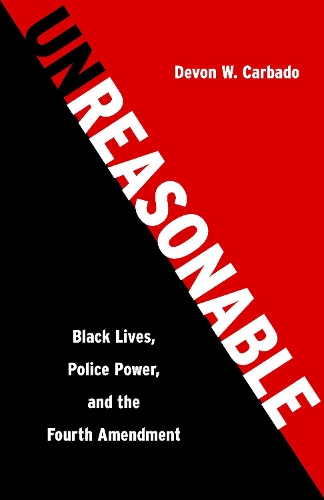
The Precarious Line: Black Lives, Police Power, and the Fourth Amendment
(Hardback)
Publishing Details
The Precarious Line: Black Lives, Police Power, and the Fourth Amendment
By (Author) Devon W. Carbado
The New Press
The New Press
12th July 2022
United Kingdom
Classifications
General
Non Fiction
Social and cultural history
Police law and police procedures
345.730522
Physical Properties
Hardback
288
Width 139mm, Height 215mm
Description
How the Supreme Courts decision to treat unreasonable policing as reasonable under the Fourth Amendment has shortened the distance between life and death for Black people
The summer of 2020 will be remembered as an unprecedented, watershed moment in the struggle for racial equality. Published on the second anniversary of the global protests over the police killings of George Floyd and Breonna Taylor, Unreasonable is a groundbreaking investigation of the role that the lawand the U.S. Constitutionplay in the epidemic of police violence against Black people.
In this crucially timely book, celebrated legal scholar Devon W. Carbado explains how the Fourth Amendment became ground zero for regulating police conductmore important than Miranda warnings, the right to counsel, equal protection and due process. Fourth Amendment law determines when and how the police can make arrests, and it determines the precarious line between stopping Black people and killing Black people.
A leading light in the critical race studies movement, Carbado looks at how that text, in the last four decades, has been interpreted by the Supreme Court to protect police officers, not African Americans; how it sanctions search and seizure as well as profiling; and how it has become, ultimately, an amendment of life and death.
Accessible, radical, and essential reading, Unreasonable sheds light on a rarely understood dimension of todays most pressing issue.
Reviews
Praise for Unreasonable:
Enriched by Carbados accessible analysis of court rulings and judicious selection of case studies, this is a powerful indictment of the criminal justice system.
Publishers Weekly
Devon Carbado cuts to the heart of the problem of over-policing and police violence in communities of color: the law itself. Unreasonable should permanently shift our discussion from bad apples to bad jurisprudenceand sets the stage for the most important new front in the battle for Black lives.
Kimberl Crenshaw, co-founder and executive director, African American Policy Forum
Unreasonable heralds a lifetime achievement of cutting-edge work by Devon Carbado. Come to this brilliant and engaging book for its full blast takedown of the Supreme Court for authorizing police violence and abuse. Stay for Carbados eloquentpleato activistsand all concerned citizensabout who to resist, and how. A combustible mix of righteous anger and common sense, Unreasonable is fire.
Paul Butler, MSNBC legal analyst and author of Chokehold: Policing Black Men
Unreasonable demonstrates how the ability of the police to harass, surveil, search, intimidate, brutalize, and kill us is enshrined in our vaunted Bill of Rights and sanctioned by centuries of racism. Devon Carbados utterly brilliant break down of the Fourth Amendment you wont find on Schoolhouse Rock. But you will find it in the hands of anyone trying to understand why, despite decades of reform, policing does not make us safe. A breathtaking, compelling journey through constitutional law intended to not only enlighten but to literally save lives.
Robin D.G. Kelley, Distinguished Professor and Gary B. Nash Endowed Chair in U.S. History, University of California, Los Angeles
Unreasonable is a searing indictment of race and policing in the United States. Professor Devon Carbado explains how the law gives police tremendous, unchecked power. His account of that power is the clearest, most forceful explanation I have seen about what the failure to constrain the police means for peoples lives.
Erwin Chemerinsky, dean and Jesse H. Choper Distinguished Professor of Law, University of California, Berkeley School of Law
Author Bio
Devon Carbado is the Honorable Harry Pregerson Professor of Law at UCLA School of Law. The author of numerous articles and edited volumes, he is also the co-author of Acting White Rethinking Race in Post-Racial America. He lives in Los Angeles.
